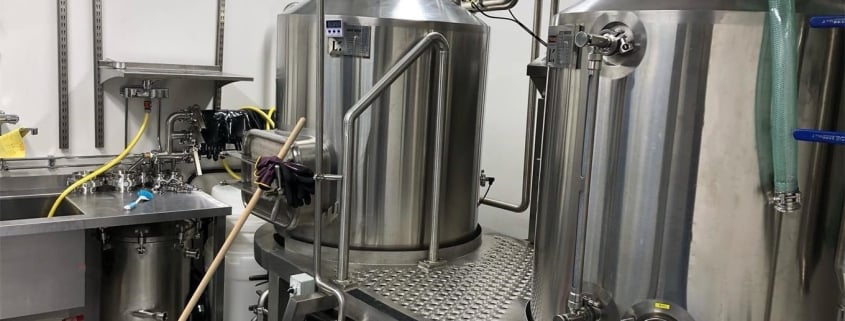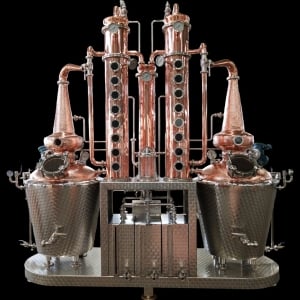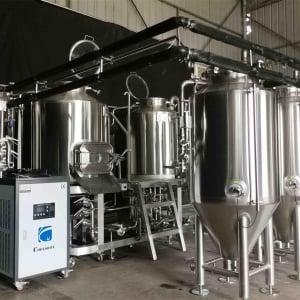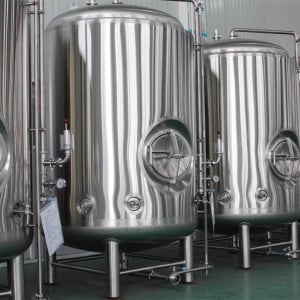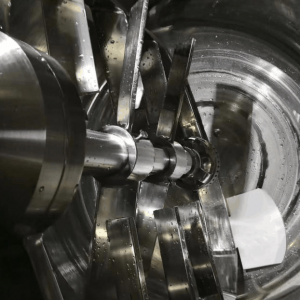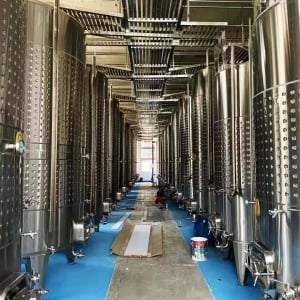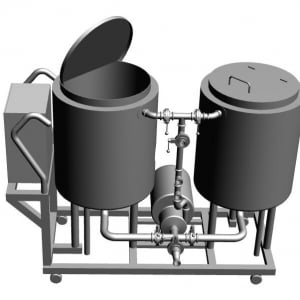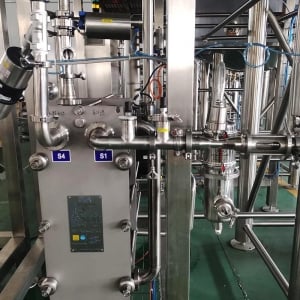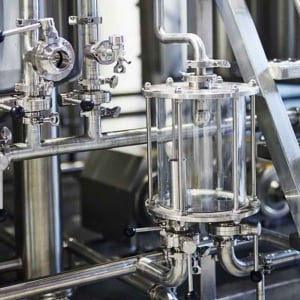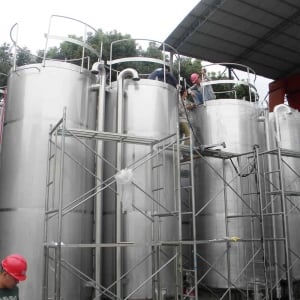conical fermenters
Conical fermenters are specialized vessels used in the beer brewing process for fermenting the wort after it has been boiled. They are designed to facilitate efficient and controlled fermentation, leading to consistent and high-quality beer production. These fermenters derive their name from their distinctive conical shape, which aids in the collection and removal of trub (spent yeast and other sediments) during and after fermentation.
The Brewing Process with Conical Fermenters
Conical fermenters play a crucial role in the brewing process, particularly during the fermentation stage. Here’s a step-by-step overview of how they are utilized:
- Wort Preparation: The first step in the brewing process is to prepare the wort, which is the sweet liquid extracted from the mashing of malted grains. This wort is then boiled with hops to impart bitterness and aroma.
- Cooling and Oxygenation: After boiling, the hot wort is rapidly cooled and transferred to the conical fermenter. At this stage, the wort is oxygenated to ensure optimal yeast growth and fermentation.
- Yeast Pitching: Once the wort is cooled to the appropriate temperature, yeast is added (pitched) into the fermenter. The yeast consumes the sugars in the wort and converts them into alcohol and carbon dioxide, a process known as fermentation.
- Fermentation: During fermentation, the conical shape of the fermenter promotes the efficient settling of trub (spent yeast and other sediments) towards the cone’s bottom. This separation helps to produce a clearer and more consistent beer.
- Racking and Conditioning: After the primary fermentation is complete, the beer is typically racked (transferred) off the trub and into a separate vessel, such as a bright beer tank or a conditioning tank, where it undergoes additional conditioning and clarification.
- Packaging and Distribution: Once the beer has reached its desired level of conditioning, it is packaged into bottles, cans, or kegs for distribution and consumption.
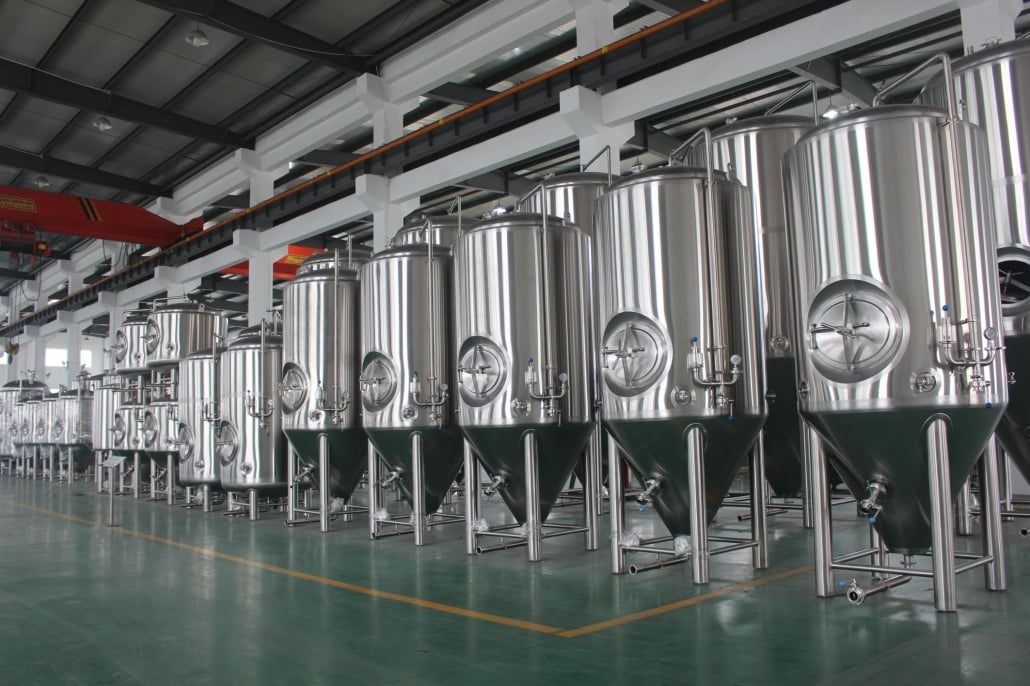
Types of Conical Fermenters
Conical fermenters are available in various sizes and materials to suit the needs of different breweries. Here are some common types:
| Fermenter Type | Description |
|---|---|
| Stainless Steel Conical Fermenters | Constructed from high-quality stainless steel, these fermenters are durable, easy to clean, and resistant to corrosion. They are commonly used in commercial breweries. |
| Plastic Conical Fermenters | Made from food-grade plastic materials, such as polyethylene or polypropylene, these fermenters are lightweight and more affordable than stainless steel options. They are often used in homebrewing or small-scale commercial operations. |
| Unitank Conical Fermenters | These fermenters combine the functions of a unitank (a single vessel for multiple brewing processes) and a conical fermenter. They allow for fermentation, conditioning, and serving from the same vessel, reducing the need for additional equipment. |
| Jacketed Conical Fermenters | These fermenters feature a jacket or outer shell that can be filled with a cooling or heating medium, allowing for precise temperature control during fermentation. This feature is essential for producing consistent and high-quality beers. |
Capacities, Spaces, and Customization of Conical Fermenters
Conical fermenters are available in various capacities to accommodate different brewing scales. Here are some common capacity ranges:
| Capacity Range | Description |
|---|---|
| Homebrewing Fermenters | Typically range from 5 to 15 gallons (19 to 57 liters) in capacity, suitable for small-scale homebrewing operations. |
| Small Commercial Fermenters | Ranging from 15 to 60 gallons (57 to 227 liters), these fermenters are suitable for small craft breweries or pilot batches. |
| Large Commercial Fermenters | Can range from 60 gallons (227 liters) up to several thousand gallons, designed for large-scale commercial brewing operations. |
In addition to capacity, conical fermenters can be customized to suit specific brewing requirements. Some customization options include:
- Specialized fittings and ports for sampling, temperature probes, and other accessories
- Insulation or cooling jackets for temperature control
- Automated control systems for monitoring and adjusting fermentation parameters
- Unique shapes or designs to accommodate specific brewing setups or space constraints
Conical Fermenter Suppliers and Price Ranges
There are numerous suppliers of conical fermenters, ranging from specialized brewing equipment manufacturers to general industrial suppliers. Here are some examples of suppliers and their approximate price ranges:
| Supplier | Price Range | Description |
|---|---|---|
| Ss Brewtech | $500 – $5,000+ | A leading manufacturer of stainless steel brewing equipment, including conical fermenters for homebrewing and small commercial operations. |
| Blichmann Engineering | $600 – $3,000+ | Known for their high-quality homebrewing equipment, including conical fermenters made from stainless steel and plastic. |
| Spike Brewing | $1,500 – $10,000+ | Offers a range of conical fermenters and other brewing equipment for small to medium-sized commercial breweries. |
| GW Kent | $5,000 – $50,000+ | A supplier of large-scale commercial brewing equipment, including conical fermenters with capacities from hundreds to thousands of gallons. |
| Alfa Laval | $10,000 – $100,000+ | A global manufacturer of industrial equipment, including jacketed conical fermenters for commercial breweries. |
Please note that these price ranges are approximate and can vary based on factors such as capacity, material, customization, and location.
Installation, Operation, and Maintenance of Conical Fermenters
Proper installation, operation, and maintenance of conical fermenters are essential for ensuring consistent and high-quality beer production. Here are some key considerations:
| Aspect | Description |
|---|---|
| Installation | Conical fermenters should be installed on a level surface with adequate space for access and maintenance. Proper connections for utilities like water, electricity, and cooling systems must be established. |
| Cleaning and Sanitation | Regular cleaning and sanitation are crucial to prevent contamination and ensure consistent beer quality. Fermenters should be cleaned with appropriate cleaners and sanitizers, following recommended procedures. |
| Temperature Control | Maintaining the proper fermentation temperature is essential for consistent and efficient fermentation. Fermenters with temperature control systems or cooling jackets should be monitored and adjusted as needed. |
| Monitoring and Sampling | Regular monitoring and sampling of the fermentation process are important for quality control. Fermenters should have appropriate sampling ports and instrumentation for monitoring parameters like temperature, gravity, and pH. |
| Maintenance and Repairs | Regular maintenance, such as checking for leaks, inspecting gaskets and seals, and performing any necessary repairs, can help extend the lifespan of the fermenter and prevent costly downtime. |
Choosing the Right Conical Fermenter Supplier
When selecting a conical fermenter supplier, there are several factors to consider to ensure you get the right equipment for your brewing needs. Here are some key considerations:
| Consideration | Description |
|---|---|
| Reputation and Experience | Choose a supplier with a proven track record and extensive experience in manufacturing brewing equipment. Reputable suppliers are more likely to offer high-quality products and reliable customer support. |
| Quality of Materials | Ensure that the fermenters are constructed from high-quality materials suitable for food-grade applications, such as stainless steel or food-grade plastic. This will ensure durability, easy cleaning, and resistance to corrosion. |
| Customization Options | Evaluate the supplier’s ability to offer customization options to meet your specific brewing requirements, such as specialized fittings, temperature control systems, or unique designs. |
| After-sales Support | Consider the level of after-sales support provided by the supplier, including installation assistance, training, spare parts availability, and maintenance services. Good support can help ensure smooth operation and minimize downtime. |
| Pricing and Value | While cost is an important factor, it should be balanced against the quality and features of the equipment. Compare prices from multiple suppliers and consider the long-term value and return on investment. |
Pros and Cons of Conical Fermenters
Like any brewing equipment, conical fermenters have their advantages and limitations. Here’s a comparison of the pros and cons:
| Pros | Cons |
|---|---|
| Efficient trub separation and removal, resulting in clearer beer | Higher initial investment cost compared to traditional fermenters |
| Enhanced control over fermentation parameters, leading to consistent beer quality | Require more space and specialized installation compared to traditional fermenters |
| Improved beer clarity and stability due to reduced yeast and sediment carry-over | Potential for oxygen exposure during racking or transferring if not properly handled |
| Easier to harvest and reuse yeast for future batches | More complex cleaning and maintenance procedures due to the conical shape |
| Better utilization of fermentation space, allowing for higher fermentation capacity | Limited portability and mobility compared to traditional fermenters |
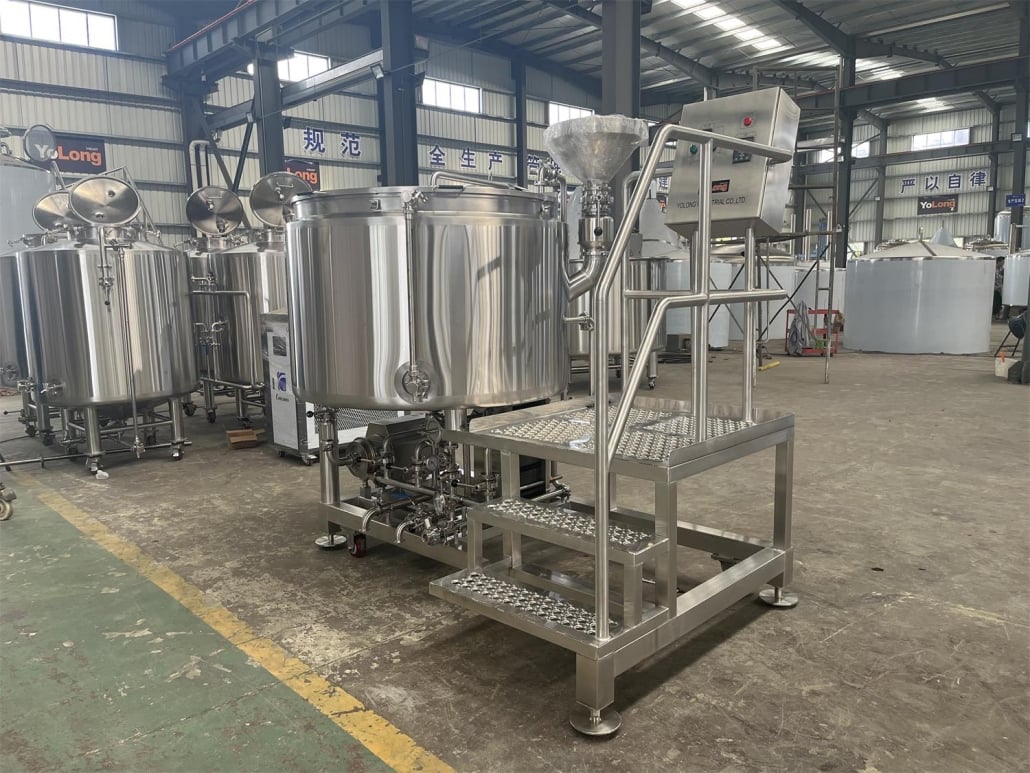
FAQs
| Question | Answer |
|---|---|
| What is the advantage of using a conical fermenter over a traditional fermenter? | Conical fermenters provide efficient separation and removal of trub (spent yeast and sediments), resulting in clearer beer and improved quality. The conical shape also allows for better utilization of fermentation space and easier yeast harvesting. |
| How do I clean and sanitize a conical fermenter? | Cleaning and sanitizing conical fermenters involve several steps, including disassembling removable parts, soaking in caustic cleaners, rinsing, and sanitizing with approved sanitizers. Proper cleaning and sanitation are crucial for preventing contamination and ensuring consistent beer quality. |
| Can conical fermenters be used for other brewing processes besides fermentation? | Yes, some conical fermenters, such as unitank fermenters, can be used for multiple brewing processes, including fermentation, conditioning, and serving. However, their primary purpose is for fermentation. |
| How often should I replace or upgrade my conical fermenter? | The lifespan of a conical fermenter can vary depending on factors such as usage, maintenance, and material quality. Generally, high-quality stainless steel fermenters can last for decades with proper care and maintenance. Periodic upgrades or replacements may be necessary to incorporate new technology or meet changing production needs. |
| Can conical fermenters be used for homebrewing? | Yes, smaller-capacity conical fermenters made from stainless steel or food-grade plastic are available for homebrewing operations. They offer similar benefits of efficient trub separation and improved beer clarity, even on a smaller scale. |

